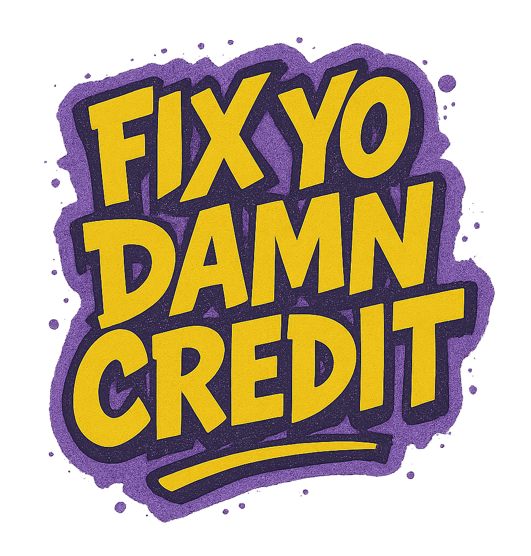



It's time to Fix Yo Damn Credit!
Look… we’re not here to judge. We’ve all swiped that card with our fingers crossed like, “Please go through.” But enough is enough. It's time to stop playing hide-and-seek with your credit score. Whether it’s ducking calls from unknown numbers (spoiler: it's collections) or getting hit with interest rates higher than your cousin on 4/20 — this ain’t it. Let’s fix yo damn credit and get you back to living like a grown-up with goals.


Get Your Free Credit Consultation
Take the first step towards financial freedom
Here are the Top 5 Reasons Why Your Credit Might Not Be Good:
1. Late or Missed Payments
Payment history is the single most important factor in your credit score, accounting for about 35% of the total. Missing credit card payments, loan installments, or even utility bills can lead to derogatory marks on your report.
Impact: Just one 30-day late payment can drop your score by 50 to 100 points, especially if your credit was otherwise clean.
2. High Credit Utilization Ratio
This refers to the percentage of your available credit that you're currently using. Ideally, you want to keep this below 30%of your credit limits. High balances relative to your limits suggest financial strain.
Example: If you have a $5,000 credit limit and you’re using $4,500, your utilization is 90%, which is a red flag to lenders.
3. Too Many Hard Inquiries
Each time you apply for a credit card, loan, or even some rental properties, a hard inquiry is added to your credit report. Too many hard pulls in a short time can lower your score and make you look credit-hungry.
Note: Soft inquiries (like checking your own score) don’t hurt, but more than 2–3 hard inquiries within 12 months can start to impact your score.
4. Collections or Charge-Offs
Accounts sent to collections or charged-off by the creditor are major derogatory items. These usually result from unpaid debts and can stay on your report for up to 7 years, even if paid off later.
Pro Tip: Always try to negotiate “Pay for Delete” if settling a collection.
5. Lack of Credit History or Thin File
Having no credit or very little active credit history can actually be a problem. Lenders have nothing to assess your risk, which can limit your score or even result in denials.
Fix: Open a secured credit card, become an authorized user, or use credit builder accounts to establish history.

Having bad credit (a FICO score below 580–620) can hurt you in more ways than just money. Here's a breakdown of how it affects your life:
🚫 1. You’ll Pay Higher Interest Rates
Lenders see bad credit as a risk, so they charge you more to borrow money. That means:
Higher car loan payments
Expensive credit card APRs
You could end up paying thousands more over the life of a loan
Example: A good credit score could get you a 5% auto loan, but a bad score could mean 18% or more.
❌ 2. You May Be Denied for Loans or Credit Cards
Bad credit can lead to automatic denials for:
Credit cards
Car loans
Mortgages
Business funding
Personal loans
Even when approved, the limits are often low, and the terms are unfavorable.
🏠 3. It Can Stop You From Renting a Home
Landlords check your credit to decide if you’re reliable. If your credit is poor:
You may be denied a lease
You might have to pay a bigger deposit
You could need a co-signer
Some property managers won’t even consider you without at least a 600+ score.
💼 4. You Might Not Get the Job
Yes—employers in industries like finance, law enforcement, and government may review your credit report before hiring.
Poor credit might suggest:
Irresponsibility
Risk of theft or fraud
Poor decision-making
🔌 5. You’ll Pay Deposits for Everyday Utilities
Bad credit can make companies demand deposits for:
Electricity
Water
Cell phone service
Internet and cable
That’s money you could use elsewhere—tied up just to get the basics.
🚗 6. Higher Insurance Premiums
Many insurers check credit scores to assess risk. With a low score, you’ll likely:
Pay more for car insurance
Get fewer discounts
Have limited policy options
🛑 7. You Miss Out on Opportunities
Harder to start a business
Harder to travel (some hotels & rentals require credit)
Harder to access emergency funding
Bad credit limits your lifestyle, even if you’re making money.


